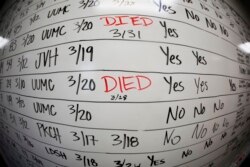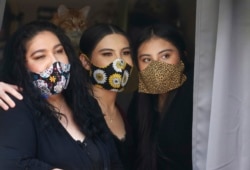Around the world, special health workers are playing a part in efforts to prevent the spread of the coronavirus. They are serving as contact tracers.
Contact tracing involves investigative and nursing skills, among others. Tracers seek information from COVID-19 patients about their contacts with other people. The goal is to create a map of every place an infected person has been and whom they have met.
Some countries have developed national systems. In the United States, programs are created by the states.
Mackenzie Bray is a contact tracer in the state of Utah.
She usually investigates sexually-passed diseases. Now, she is one of 130 people at the Salt Lake County health department ordered to track coronavirus cases in the Salt Lake City area. The investigators, many of them nurses, each work on 30 to 40 cases at a time. They try to talk to every person who came within 1.8 meters of the infected person for 10 minutes or more.
On one recent case, Bray called a retired man just confirmed to have COVID-19. She said she asked him many questions about whom he had been near in the seven days before the call. She also suggested that he go through his bank statements to help him remember which stores he might have visited.
During the call, the man’s wife said that family members had come to the couple’s home on Mother’s Day. Bray asked if the group had shared food or drinks. The answer was yes. Suddenly, the contact tracer had more people to call.
Tracers try to contact every person who came within two meters of an infected person. They remain in touch with some of the people throughout the 14-day virus incubation period. A single telephone call can take 30 minutes or more as tracers must ask a long list of questions.
Some experts estimate that 300,000 contract tracers might be needed in the U.S. to limit the spread of the coronavirus. States like Utah say they have enough, but other states say they need hundreds or even thousands more.
The contact tracers often deal with a lot of conflicting information. Language and culture barriers can add misunderstanding into the data. Sometimes people do not answer questions from tracers truthfully, by accident or purposely.
Health investigator Maria DiCaro was in contact with one infected man who suddenly stopped returning DiCaro’s calls. She discovered he had been sleeping in his car because of marriage problems. DiCaro found out when she questioned the man’s child.
DiCaro said she needs people to cooperate with her. No one is legally required to answer questions. So, she has found that treating people with kindness works better than strong words.
Bray, the Utah investigator, said, “People sometimes think contact tracing is black and white but there is a lot of gray that goes into it.”
Anissa Archuleta and members of her family were exposed to a man infected with coronavirus at a birthday party. DiCaro called the family every day for two weeks. During that time, the family was tested and found not to have the coronavirus. But, DiCaro learned a lot about the family.
After a while, Archuleta began asking DiCaro about how she was doing and thanked her for caring about her and her family.
DiCaro said it made her feel good to hear the praise and thanks for her work.
“It’s nice to be appreciated,” she said.
I’m Mario Ritter Jr.
Brady McCombs reported this story for the Associated Press. Mario Ritter Jr. adapted it for VOA Learning English. Caty Weaver was the editor.
______________________________________________
Words in This Story
incubation –n. the time it takes for an organism or virus to become fully developed
black and white --idiom








